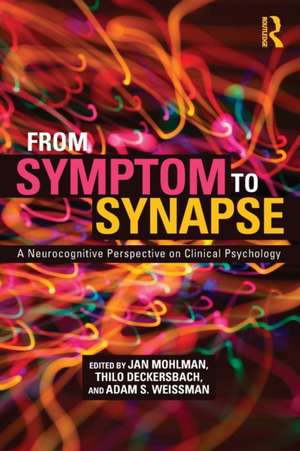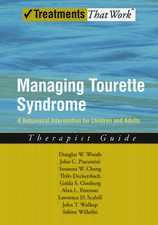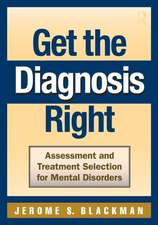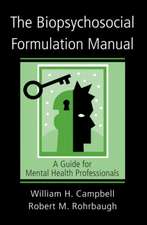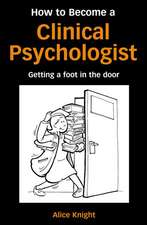From Symptom to Synapse: A Neurocognitive Perspective on Clinical Psychology
Editat de Jan Mohlman, Thilo Deckersbach, Adam Weissmanen Limba Engleză Paperback – 22 ian 2015
| Toate formatele și edițiile | Preț | Express |
|---|---|---|
| Paperback (1) | 499.40 lei 6-8 săpt. | |
| Taylor & Francis – 22 ian 2015 | 499.40 lei 6-8 săpt. | |
| Hardback (1) | 1104.01 lei 6-8 săpt. | |
| Taylor & Francis – 22 ian 2015 | 1104.01 lei 6-8 săpt. |
Preț: 499.40 lei
Preț vechi: 525.68 lei
-5% Nou
Puncte Express: 749
Preț estimativ în valută:
95.57€ • 103.78$ • 80.28£
95.57€ • 103.78$ • 80.28£
Carte tipărită la comandă
Livrare economică 22 aprilie-06 mai
Preluare comenzi: 021 569.72.76
Specificații
ISBN-13: 9780415835879
ISBN-10: 0415835879
Pagini: 400
Ilustrații: 12 black & white illustrations, 2 black & white tables
Dimensiuni: 152 x 229 x 21 mm
Greutate: 0.54 kg
Ediția:1
Editura: Taylor & Francis
Colecția Routledge
Locul publicării:Oxford, United Kingdom
ISBN-10: 0415835879
Pagini: 400
Ilustrații: 12 black & white illustrations, 2 black & white tables
Dimensiuni: 152 x 229 x 21 mm
Greutate: 0.54 kg
Ediția:1
Editura: Taylor & Francis
Colecția Routledge
Locul publicării:Oxford, United Kingdom
Cuprins
1. Integrating Brain and Body Measures with the Study of Psychological Disorders J.Mohlman, T.Deckersbach, & A.S.Weissman 2. Tools of the Neurocognitive Psychologist C.M.Deveney 3. Pediatric Anxiety A.Sturm, S.W. Chang 4. Neurocognitive Perspectives on Anxiety and Related Disorders S.J.Moshier, A.W.Calkins, M.A.Kredlow, M.W.Otto 5. Anxiety in Cognitively Intact Older Adults J.Mohlman, S.A Beaudreau, R.B.Price 6. Neurocognitive Approaches in the Treatment of ADHD, A.S.Weissman, J.Lichtin, A.P.Danzig 7. Neurocognition in Schizophrenia: A Core Illness Feature and Novel Treatment Target M.M.Kurtz 8. Pediatric Depression: Neurocognitive Function and Treatment Implications, J.C.Britton, S.M.Kennedy, I.Seager, A.H. Queen, M.V.Hernandez, C.N.Spiro, J.Ehrenreich-May 9. A Neurocognitive Approach to Major Depressive Disorder: Combining Biological and Cognitive Interventions, R.D. Raedt 10. Bipolar Disorder: A Neurocognitive Perspective, T.Deckersbach, N.Kaur, N.S.Hansen 11. Treatment of Phantom Limb Pain; Application of Neuroscience to a Disorder of Neuroplasticity, J.R. McQuaid 12. Substance Use Disorders, S.M.Gorka, Y.Chen, S.B.Daughters 13. Paving the Road to the Neurocognitive Clinic of Tomorrow: Appealing to Standards, N.Hansen, G.Siegle
Notă biografică
Jan Mohlman, PhD, is Associate Professor at William Paterson University.
Thilo Deckersbach, PhD, is Associate Professor of Psychology at Harvard Medical School.
Adam S. Weissman, PhD, is the Founder and Executive Director of Child and Family Cognitive Behavioral Psychology, PLLC, in Scarsdale and Manhattan and is on the clinical faculty at Columbia University.
Thilo Deckersbach, PhD, is Associate Professor of Psychology at Harvard Medical School.
Adam S. Weissman, PhD, is the Founder and Executive Director of Child and Family Cognitive Behavioral Psychology, PLLC, in Scarsdale and Manhattan and is on the clinical faculty at Columbia University.
Recenzii
"Mohlman, Deckersbach, and Weissman provide a splendid introduction to the neurocognitive perspective. They have selected top scholars to write thorough, thought-provoking overviews which are highly accessible and informative. Importantly, although this volume is organized around traditional diagnostic categories, it gently forces the reader to think in a transdisciplinary fashion. The resulting book brings us many steps closer to understanding fundamental processes that underlie individual differences in mental health symptoms and their effective treatment." – J. Gayle Beck, PhD, Lillian and Morrie Moss Chair of Excellence, Department of Psychology, University of Memphis
"This remarkable volume is a bold and much-needed step toward integrating and bridging neuroscience and clinical psychology. Drs. Mohlman, Deckersbach, and Weissman assembled an outstanding group of experts to pave the way for the next generation of a neuroscience-informed clinical psychology. A prime example for a cross-disciplinary approach, this excellent book is a must-read for any scientifically-based mental health care professional." – Stefan G. Hofmann, PhD, Professor of Psychology; Department of Psychological and Brain Sciences, Boston University; Author, An Introduction to Modern CBT
"This book provides a fascinating look into how discoveries in basic science can be used to inform and improve psychological treatments for a wide range of mental health issues. The research reported in this book is at the forefront of the most exciting work in clinical psychology and provides fresh new ideas about how to develop state-of-the-art psychological treatments." – Christopher G. Beevers, PhD, Professor of Psychology and Director of the Institute for Mental Health Research, University of Texas at Austin
"This book bridges the gap between basic and clinical science and provides an important perspective for understanding the nature and treatment of psychiatric problems. The integrative neurocognitive viewpoint of this volume expertly examines theory and data in a way that offers an invaluable approach to mental health problems. From professional researchers and psychotherapists to students alike, the authors have done a superb job producing a text that will be indispensable for all students of mental health." – Rick Ingram, PhD, Director of Clinical Training, Department of Psychology, University of Kansas
"The text is well-written and bursting with valuable findings and punctuated with references to not only the limits of current knowledge, but also future opportunities. As such, the text can be successfully added to the reading list of graduate courses in abnormal psychology and clinical practice to recognize the changing nature of a field and enhance the training of future mental health professionals. The clarity of its narrative makes the work even suitable to undergraduate courses and of interest to all readers who want to deepen their knowledge of forms of mental illness, and become aware of sensible practices of assessment and intervention. All in all, it is a good read." – Maura Pilotti, Ph.D., Ashford University for Metapsychology
"From Symptom to Synapse: A Neurocognitive Perspective on Clinical Psychology, edited by Jan Mohlman, Thilo Deckersbach, and Adam Weissman, is timely and much needed. Translating sound cognitive neuroscience research into applied psychological interventions for common psychiatric disorders will help the field of clinical psychology evolve in the current healthcare climate... [The] information provided in each chapter would make a worthy addition to any doctoral level clinical intervention course... The book is a great reference for graduate students who are progressing through their training and need a text to supplement their understanding of the neural correlates associated with the onset, maintenance, and treatment of some of the more prevalent psychiatric disorders, as well as for practicing clinical psychologists who need to reorient their working treatment perspective toward a neurocognitive framework. There are excellent, easily understood reference tables throughout the book that help clarify the utility of the neurocognitive approach... [For] promoting clincial psychologists' focus on grounded neuroscience rather than pseudoscientific 'neuro-bunk,' From Symptom to Synapse is an excellent start in the right direction." -Kendra Campbell, University of Alaska Fairbacks, and Paul Dukarm, private practice, Alaska, for PsycCRITIQUES
"This remarkable volume is a bold and much-needed step toward integrating and bridging neuroscience and clinical psychology. Drs. Mohlman, Deckersbach, and Weissman assembled an outstanding group of experts to pave the way for the next generation of a neuroscience-informed clinical psychology. A prime example for a cross-disciplinary approach, this excellent book is a must-read for any scientifically-based mental health care professional." – Stefan G. Hofmann, PhD, Professor of Psychology; Department of Psychological and Brain Sciences, Boston University; Author, An Introduction to Modern CBT
"This book provides a fascinating look into how discoveries in basic science can be used to inform and improve psychological treatments for a wide range of mental health issues. The research reported in this book is at the forefront of the most exciting work in clinical psychology and provides fresh new ideas about how to develop state-of-the-art psychological treatments." – Christopher G. Beevers, PhD, Professor of Psychology and Director of the Institute for Mental Health Research, University of Texas at Austin
"This book bridges the gap between basic and clinical science and provides an important perspective for understanding the nature and treatment of psychiatric problems. The integrative neurocognitive viewpoint of this volume expertly examines theory and data in a way that offers an invaluable approach to mental health problems. From professional researchers and psychotherapists to students alike, the authors have done a superb job producing a text that will be indispensable for all students of mental health." – Rick Ingram, PhD, Director of Clinical Training, Department of Psychology, University of Kansas
"The text is well-written and bursting with valuable findings and punctuated with references to not only the limits of current knowledge, but also future opportunities. As such, the text can be successfully added to the reading list of graduate courses in abnormal psychology and clinical practice to recognize the changing nature of a field and enhance the training of future mental health professionals. The clarity of its narrative makes the work even suitable to undergraduate courses and of interest to all readers who want to deepen their knowledge of forms of mental illness, and become aware of sensible practices of assessment and intervention. All in all, it is a good read." – Maura Pilotti, Ph.D., Ashford University for Metapsychology
"From Symptom to Synapse: A Neurocognitive Perspective on Clinical Psychology, edited by Jan Mohlman, Thilo Deckersbach, and Adam Weissman, is timely and much needed. Translating sound cognitive neuroscience research into applied psychological interventions for common psychiatric disorders will help the field of clinical psychology evolve in the current healthcare climate... [The] information provided in each chapter would make a worthy addition to any doctoral level clinical intervention course... The book is a great reference for graduate students who are progressing through their training and need a text to supplement their understanding of the neural correlates associated with the onset, maintenance, and treatment of some of the more prevalent psychiatric disorders, as well as for practicing clinical psychologists who need to reorient their working treatment perspective toward a neurocognitive framework. There are excellent, easily understood reference tables throughout the book that help clarify the utility of the neurocognitive approach... [For] promoting clincial psychologists' focus on grounded neuroscience rather than pseudoscientific 'neuro-bunk,' From Symptom to Synapse is an excellent start in the right direction." -Kendra Campbell, University of Alaska Fairbacks, and Paul Dukarm, private practice, Alaska, for PsycCRITIQUES
Descriere
This edited volume bridges the gap between basic and applied science in understanding the nature and treatment of psychiatric disorders and mental health problems. Topics such as brain imaging, physiological indices of emotion, cognitive enhancement strategies, neuropsychological and cognitive training, and related techniques as tools for increasing our understanding of anxiety, depression, addictions, schizophrenia, ADHD, and other disorders are emphasized. Mental health professionals will learn how to integrate a neurocognitive perspective into their clinical research and practice of psychotherapy.
